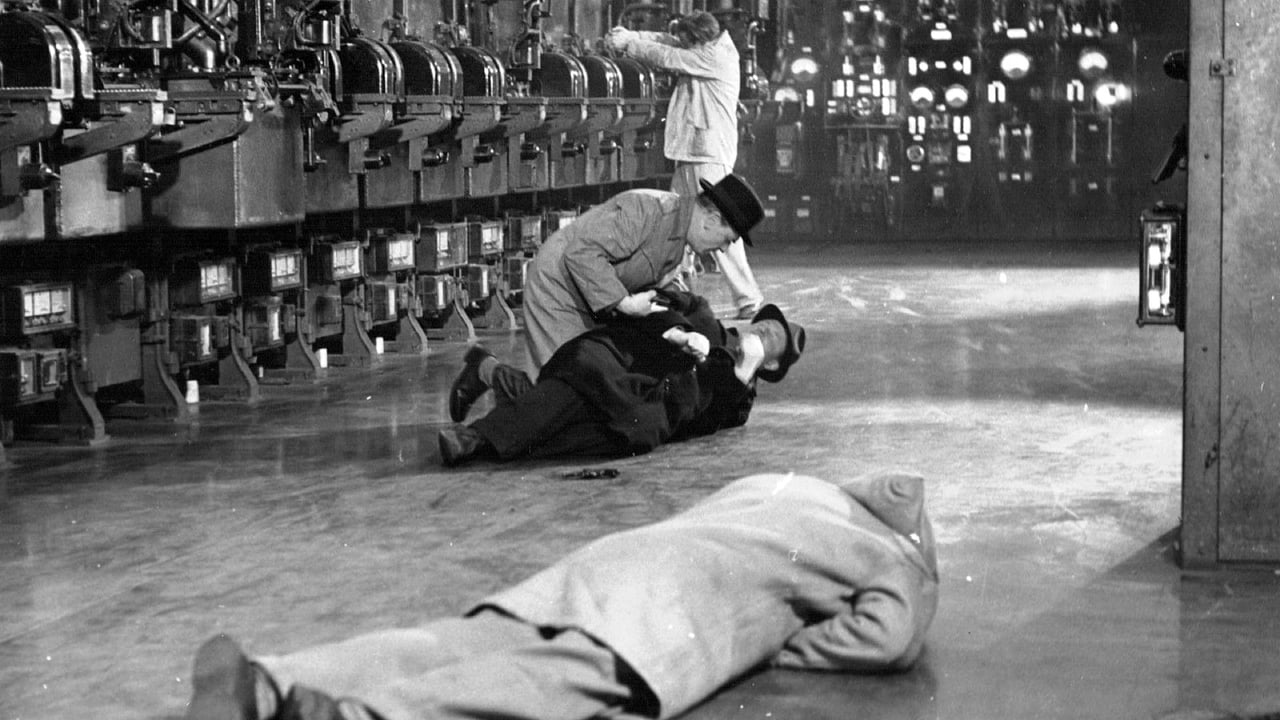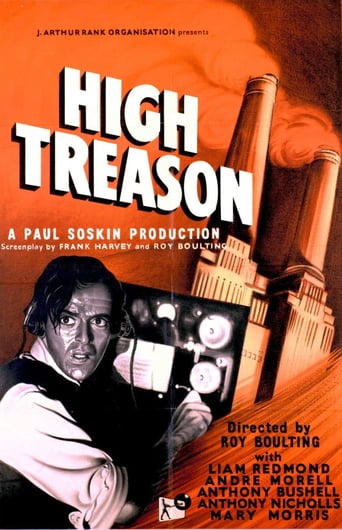

Plot so thin, it passes unnoticed.
... View MoreA film of deceptively outspoken contemporary relevance, this is cinema at its most alert, alarming and alive.
... View MoreIf you're interested in the topic at hand, you should just watch it and judge yourself because the reviews have gone very biased by people that didn't even watch it and just hate (or love) the creator. I liked it, it was well written, narrated, and directed and it was about a topic that interests me.
... View MoreThe thing I enjoyed most about the film is the fact that it doesn't shy away from being a super-sized-cliche;
... View MoreAfter a big explosion in the London Docks, Scotland Yard and MI5 join forces to find the ones responsible. Meanwhile the bombers, a group of communists, set their eyes on a much larger target, several power stations around the country, including London's Battersea power station. The group have enlisted a weakling shop seller as one of their helpers, but he slowly starts to crumble and fall apart. Meanwhile the investigators go over each lead and are slowly able to identify members of the group. But they don't know when the next attack will be or where.A Cold War thriller that starts with a bang and ends with a big finale inside Battersea power station. By shifting the focus back and forth between the investigators and the Communist group (which is never mentioned directly, but strongly implied), including the moments where their paths cross, the movie maintains tension and suspense. The cast isn't too well-known but contains a ton of familiar British character actors, from the lead detectives, Liam Redmond ('Night of the Demon') and André Morell ('The Bridge on the River Kwai') to the leader of the group, John Bailey ('Never Let Go') to Geoffrey Keen (Sir Frederick Gray in half a dozen James Bond movies) and so on.Directed and co-written by Roy Boulting, one half of the Boulting brothers ('Brighton Rock', 'Seven Days to Noon'), and with future acclaimed cinematographer Gilbert Taylor behind the camera ('Star Wars', 'Dr. Strangelove or: How I Learned to Stop Worrying and Love the Bomb'), this movie is expertly made. It's got a nice pace to it, and by mixing interior studio sets and exterior on-location shots in London, as well as inside Battersea power station, the movie also looks pretty nice. It's not a classic by any means, but hard to go wrong with this one.
... View MoreThere's a moment that seems to sum up the emotional tonus of this story of Commie espionage in London. Anthony Bushell has been sent undercover by Scotland Yard to investigate some avant-garde musical society that seems somehow connected to a terrible explosion at the docks.When the chief Scotland Yard investigator, Redmond, initially asks Bushell if he has any interest in music, Bushell replies dead-pan, "Why, do you need help moving a piano?" Bushell, undercover, attends a meeting of the society after joining it, and he sits in the audience, arms folded, while the speaker introduces a piece for a string trio that was the composer's "first effort -- and also his last." Yes, the music they play is very dramatic, the speaker tells us, but underneath there is lyricism and "some jolly good tunes." On stage, the trio launch into a lugubrious cascade of clashing chords that might sound appropriate if you were watching some kind of pop version of Dracula while on mushrooms. It dissolves your basilar membranes. It fuses your middle ear. The two violins moan and the cellist is going ape, throwing his hair wildly around. Well, Bushell has a face that's about as interesting as a hard-boiled egg, but his features twist into first horror, then disbelief as the flood of dissonance flows on and he rest of the audience sits rapt. I found the scene hilarious, and it didn't strike me as an imitation of Hitchcock in any way.The whole movie is like that. The events are serious indeed -- Soviet agents at work blowing up London -- but the dialog is quick and witty and layered over with a kind of strictly British humor -- or I should say "humour" -- that's hard to define. When the inspectors unexpectedly discover a murdered spy, one of them glances at it and says, "Hello." You never find this sort of stuff on "Law and Order" but you can find good examples in films like "Mona Lisa." And, though there are wisecracks in abundance in most American cop movies, they sound hyperbolic and slightly coarse.I'm skipping over the plot because, like most espionage and spy thrillers, it's pretty complicated. Men in overcoats following suspicious women in heels across city streets. Basically, it's a story of Redmond, Morrell, Bushell, and the rest incrementally pinning down the Red Menace, who might as well be gangsters as far as the dynamics are concerned. Some of the heavies are rough guys, some are pathetic sissies, a clerk in a bowler looks like T. S. Eliot, and the one at the top is suavely evil -- not much originality there. It's a serious movie. The Reds are all bastards. They kill one another without remorse if it moves the cause one step forward.The performances are all fine, except when the actors are hobbled by stereotypical roles. There's nothing special about the direction but the climactic confrontation is agreeably noirish -- all those wet cobblestone streets glistening under the lamps -- and the shoot out is well staged and exciting.
... View MoreAn otherwise workmanlike British thriller with familiar overtones of anti-Communist paranoia is salvaged by a lively script that underplays the bellicose propagandizing of other, similar witch-hunts. The emphasis instead is on action and character and some colorful local dialogue, as a network of saboteurs infiltrates the highest (and lowest) levels of democracy with nefarious plots to undermine England's power structure. The enemy agents are never precisely identified (it's clear who they are long before the authorities catch them 'Red' handed), and of course they're no match for the stiff upper lips of Scotland Yard, although it takes an extended gun battle at the Battersea power station to prove it. The film was less flattering and thus less popular than its predecessor, 'Seven Days to Noon', but seen today it remains an enjoyable, well-crafted relic from the warmer days of the Cold War.
... View MoreI agree with the writer of the previous comments. This is a little gem of a thriller, not because it has unusual plot twists, or even especially good acting, but because of its fantastic pacing (more like a modern thriller than the usual fare from 1951), and because of its fabulous shot-on-location scenes that put you right in post-war London. I grew up in post- war Britain, so perhaps I'm biased; but some of my favourite films are those which manage to escape the confines of the studio, something that was much rarer in those days than it is now. The world of the film is now more than half a century distant, and when you watch those streets, buses, and cars, those people walking around, it's slightly shocking to realize that many of them now sleep the big sleep, that you're looking through a window into the past. This alone, for me, is worth the price of admission.The film is also the least talked about, most neglected of all Boulting's films, and as far as I can make out, hasn't ever been released on VHS, let alone on DVD, probably because, once the 1960s New Left had come into the ascendancy, especially in the various film studies institutes, the kind of old fashioned Cold War politics Boulting's film embodies were seen as both embarrassing and naive. Well, it's time for a re-evaluation. The politics of the film never did make much sense, so what we're left with is an exciting, well-crafted, and beautifully paced thriller, one that has, perhaps surprisingly, more heft than many contemporary thrillers, certainly more pizazz than the usual James Bond entries. If you can see it (and I discovered it courtesy of A&E, who ran it as a kind of joke several times in the early 1980s) sit back and enjoy it.
... View More